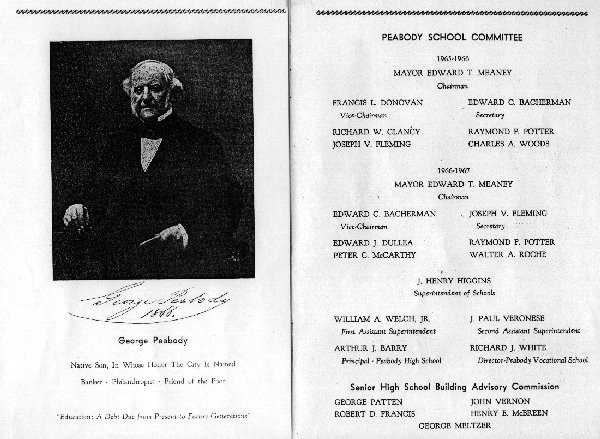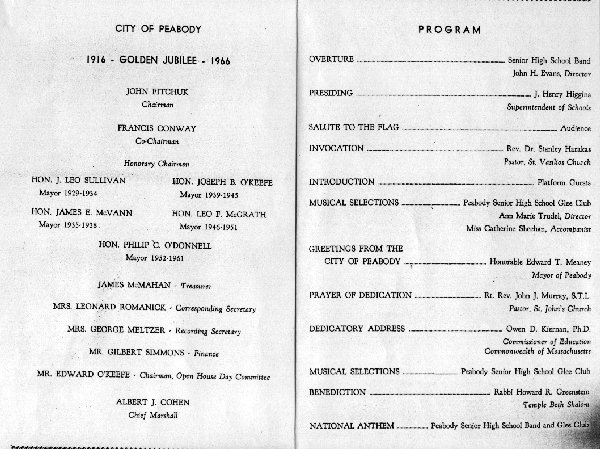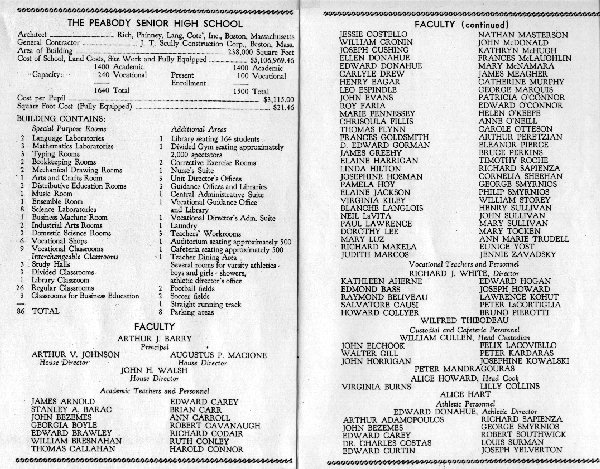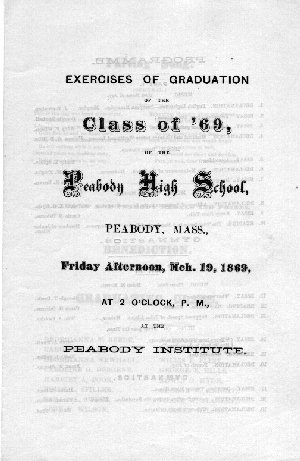 Graduation
Exercise Program, March 19, 1869
Graduation
Exercise Program, March 19, 1869Learning under
double sessions.
By Chris Rudel
1962. Even before the city's new high school on Allen's Lane was
Note: From the information I have accumulated through the cooperation
of Mr. Andrew Metropolis and the available resources, including the histories
of five Peabody high schools, I have created a concept of life: learning
through a confused high school facility.
In the Beginning
In the late 1950's when Peabody's population was at its average low,
a significant event occurred - one small housing development was erected.
This was Centerfield, and it started the city's record population boom!
The Population Boom
The early 1960's brought a progressive surprise to sparsely populated
West Peabody. It began to develop a district change, houses! The population
increase caused the need for those new housing areas. This created numerous
problems for the high school on Central Street.
The Sacrifices
During 1962, Senior and Junior levels of Ancient History classes were
being held routinely on stage. It was only one of the three classes being
held on stage. The classes were separated only by a wall crawling to a
height just short of the ceiling.
The cafeteria, which could house a large community of students, was
also a site for several classes. This distracted many pupils due to the
high noise level and compact size of the "classrooms".
There was no evidence that the absence of physical education, which
had to be dropped, caused any serious or prolonged damage.
Aside from the boom of population and student enrollment, split school
schedules were formed. Sophomores, Juniors and Seniors were educated from
7:30 a.m. to 12:04 p.m. Freshmen attended school from 12:04 p.m. to 5 p.m.
The following year, Juniors and Seniors attended school in the morning,
followed by Freshmen and Sophomores in the afternoon.
Mysteriously, the unusual learning arrangement created a boon in the
educational benefits the pupils received. It was the peak height of intelligence
in the high school's history. Mr. Andrew Metropolis explained, "You know
how they always say the school day should be expanded and that students
don't go to school long enough. The highest college testing scores ever
done in Peabody High School were the Class of '65, my class, and of '66.
Those two years were two of the three years that we had double sessions.
We had seven National Merit Scholars in my class. We had six, I think,
that had perfect 1600's on their college boards."
APPENDIX 1
The following is a copy of Mr. Peabody’s interesting letter to
the Committee of the High Schools that appeared in the Appendix of the
Annual School Report of 1854. "It is worthy of its origin:
London, 30th Nov., 1853
To the Committee of the Holten and Peabody High Schools, of Danvers
Gentlemen: - In acknowledging the compliment paid me by giving
my name to the High School of the South Parish, in Danvers, it is my wish
to confer on the schools, over which you preside, some more substantial
benefit that appertains to a name.
My first thought was to make a small gift to the school which
bears my name, but I understand that the gentlemen composing the Committee
selected by the town, are equally connected with both schools, and I have,
therefore, determined that the pupils of both shall alike participate in
the benefit of my humble offering.
I will transmit to you, in the autumn of 1854, the sum of two-hundred
dollars, and I will continue to send the same amount, annually, (provided
the result shall be satisfactory, during my life, to be expended in prizes
for distribution as rewards of merit to the pupils at their yearly examination.
And in order to stimulate the scholars of each school to exertion
and excite in them a laudable spirit of competition, it is my wish that
there be no equal partition of the money or prizes between the two schools,
but that the entire amount be common to both, and distributed as among
the pupils of one school. Thus as the pupils of one school excel those
of the other in point of merit, or attainments, the prizes awarded them
may exceed in like proportion without any reference to the one half of
the entire amount. At the same time it will be highly desirable that every
measure be adopted which may secure impartiality.
I would also suggest that the number, and consequently the value
of the prizes be not determined until after the examination, as the number
of deserving pupils will doubtless greatly vary, and if the number of prizes
be not a limited one, the meritorious candidate may feel that however large
the number of competitors, a prize is within the reach of each one.
With these remarks I leave the matter in your hands and in the
hands of those who from time to time may succeed you, - but should you
wish to refer any matter to me, I hereby appoint my sister, Mrs. Russell,
of Georgetown, and Mr. Charles Northend, to act in my behalf.
Very respectfully and truly yours,
GEORGE PEABODY
APPENDIX 2
From the Salem Evening News, Sept. 20, 1971
‘All systems go’ Peabody High incomplete…but classes under way
PEABODY – "All system are go." That was the feeling of Acting
Schools Supt. Gregory L. Theokas Sunday night concerning the opening of
the Veterans Memorial Senior High School this morning.
More than 700 members of the sophomore class arrived at the new
$12 million building off Lowell Street this morning.
The school is far from completely furnished. But the school is
educationally functional and has passed the necessary safety tests.
The cafeteria will not be operative today or Tuesday, but is
expected to be ready for use for all students Wednesday. Any delay in the
cafeteria opening will be announced by school officials.
Theokas said Sunday night, "The only thing that is a hang-up
is the industrial arts area. Completion there might be 2 or 3 weeks away."
In regard to the housing of the students, Theokas said, "Everyone
will be housed in a classroom or in an accommodation. As far as the specific
certificate of occupancy, State Building Insp. John D. Powers said he would
not issue one until he obtained letters from each of the city department
heads."
Powers has made no move to stop today’s school occupancy.
Theokas explained that neither the planetarium nor the library
will be in full operation.
"We should get the complete parcel, I would hope, sometime by
the first of December," he said.
The acting superintendent said the school will have its students
and teachers this week. As an educator, he pointed out: "The students will
be housed in classrooms, and of course a total educational program means
a total building."
The fieldhouse is another area not quite ready for use, but Theokas
said he noticed a marked improvement in that area between Saturday and
Sunday when he had made inspections.
The fieldhouse is not an immediate element for quality education,
but is desirable. As Theokas put it late Sunday night, "The School Department
is now ready to educate the high school students."
APPENDIX 3
From the South Danvers Wizard, Feb. 20, 1867
Peabody High School Association
The first annual reunion of the Peabody High School Association
was held at the Town Hall on Monday evening. The exercises of the evening
were introduced with a few well chosen remarks from the President of the
Association, Geo. A. Osborn, Jr
The literary exercises were are as follows: Oration by Henry
Wardwell of the class of '56; Poem written by Miss Fanny Osborne and read
by Theodore S. Osborne; remarks by Messrs Thompson, Babson and Dame, present
and past teachers, concluding with an ode written for the occasion by Miss
Sarah E. Perkins. The oration of Mr. Wardwell was a finished production,
and well delivered, teaching more especially, upon the duties of the male
graduates of the school to our country in the present time of trial. He
paid an eloquent tribute to those of the school who had volunteered during
the late war and had fallen when defending our nation's flag.
The poem was a pleasing affair, descriptive of the feelings of
a child upon its entrance on a school life and the anxieties consequent
upon promotion from the lower to the highest departments, closing with
many pleasant allusions to the time spent in the High School. The exercises
of the evening were interspersed with excellent selections by Parsons &
Upton's Quadrille Band, who also furnished music for dancing. The literary
exercises being concluded, a short time was spent in a discussion of the
excellent supper furnished by caterer Cassell, of Salem. The latter part
of the evening was spent in dancing and social intercourse.
At about half past eleven it was announced that George Peabody,
Esq. would visit the hall and all returned from the dance hall to the school
room above, where he was received with unbounded enthusiasm. After an eloquent
introduction from the President, Mr. Peabody arose and addressed the audience
as follows: 'My young friends, it gives me great pleasure to meet you again.
I cannot easily find words to express my thanks for the compliment paid
me by this friendly observance of my birthday. Both here, and in the assembly
from which I have just come, my fellow-townsmen seem delighted to do me
too much honor for the little I have been able to do for them. Your president
informs me that it is eighteen years since the first class entered the
school, and now in judging by those before me, it has accomplished a good
work, which I trust will continue through many generations. If I have been
instrumental in this work, I find my reward in your happiness and thanks.
My great fatigue must be my apology for the brevity of these remarks. I
shall be pleased to take you one and all by the hand, perhaps for the last
time upon this visit, though I trust I shall be spared to meet you again
in two or three years. Let me again in closing, thank you for your kind
remembrance.'
After personally greeting nearly every person in the room, Mr.
Peabody returned to the hall below where dancing had been resumed. Here
he remained for awhile and seemed to enter into the spirit of the occasion
as much as anyone present. Shortly after Mr. Peabody's withdrawal, the
company dispersed to their homes. All the arrangements for the evening
were satisfactory, and the committee are deserving or much praise for the
attention given to details.
APPENDIX 4
Manuscript of the Peabody Historical Society
Letter from Mrs. James P. Baxter, a member of the first graduating
class-Read at the Peabody High School Reunion, 1909
…Much to my disappointment, the day your invitation was received I
was prostrated beyond hope of participating in person. Cast down, but not
destroyed, I am here today to send you my warmest greeting tinged with
the regret that I must content myself with such a meagre congratulation.
Should you ask me for reminiscences of my school days in the little
white schoolhouse on Park Street, and what the High School did for me,
I should say much, indeed it was the birthplace of the best aspirations
and purposes which actuated whatever of worth has been wrought out during
the following three score years of my life.
Our committee, without experience, did better than they knew in selecting
for the first teacher Mr. Eugene B. Hinckley. He was a man fitted to foster
and expand the best in his pupils; fresh from the classic halls of Bowdoin
such sages were not familiar in those days upon the streets of South Danvers.
He came among us with the resolution to open our eyes to broader fields
of knowledge and to take a broader outlook into the future.
Indeed he was to the girls, and in the first years, we numbered seven
girls to one boy, so we had things pretty much to our own liking, a living,
modern Apollo – some may venture to say he stands upon that same pedestal
in memory. Doubtless, we vexed him sorely, and hr despaired of polishing
such crude jewels; sometimes he tried us; but the memory of such experiences
is so dim and far-off that we cannot discern their outlines.
The opening of a High School was regarded by all as a marked event,
while a few of the older citizens who had received a so-called liberal
education, and many others who had longed in vain for such an opportunity,
took us individually to their hearts, and never failed to impress upon
us the privileges of our birthright.
How often do I bring to my vision in recent years certain dear and
revered women who constantly reminded us of our great responsibility and
urged us to give in return our noblest efforts that we might become an
honor to the town, even and anon assuring us that everybody was watching
us with anxious pride. I always have maintained that this personal interest
had a powerful inspiring influence and for their sakes, we did carry our
heads a little higher and bore ourselves more discreetly for their constant
praise, and wise but rare admonition.
I can bid you, girls and boys of the Peabody High School, no more sincere
parting good-bye than that your High School days may be as happy as were
mine, storing up memories of sweetness and gratitude to be enjoyed for
many years to come.
Yours most cordially,
Mehitabel Cummings Proctor Baxter
Portland, Maine
April 15th, 1909
APPENDIX 5
Report of the School Committee of the Town of Danvers, 1845-6
Published by a Vote of the town
by J.W. Proctor
"…The regulations for the arrangement and government of the school
has been revised during the year, and adapted to their condition as far
as practicable.
...Among the new regulations introduced, is one requiring of each teacher,
whenever they shall deem it necessary and proper to inflict corporal punishment,
to make a record of the punishment , together with the reason therefore.
How far this rule has been regarded by the several teachers, we are not
fully advised; we know that it has been observed by some of them. We also
know that others have considered it an infringement upon those salutary
rules of discipline so long guaranteed to parents and masters, and which
in ‘times gone by’ were considered essential requisites of success.
We have heard very few complaints of severity of punishment,
and have reason to believe that instances will rarely occur demanding this,
if other means of correction are discreetly and properly applied. We think
it much better to persuade the minds of children by motives and encouragement,
or addressing their understanding, to do what is right, than it is to attempt
to compel them by the application of the rod.
We would not take from teachers entirely, the authority to punish,
but we would have them use this authority with a sound discretion - always
with kindness, never with passion, with deliberation and an accompanying
explanation, calculated to convince the pupil that the punishment is inflicted
for his good. Better subject our teachers to the labor of ten extra entries
in their record that our school reproach one brutal whipping. Until the
inexpediency of this rule shall be clearly demonstrated by practical experience,
its intrinsic reasonableness will influence our minds in its favor."
...Irregular attendance upon the schools continues to be one
of the principal obstacles in the way of their improvement. It is the glory
and boast of New England that she furnished a school room for all her children;
and surely it would never be the reproach of those more favored in the
community, that any are excluded, for the want of apparel or book, which
are necessary to enable to attend....
The experience of this town, in favor of the introduction of female
teachers, accords fully with what is said to be the growing opinion throughout
the Commonwealth. Beyond question, children under twelve years of age,
can be managed quite as well or better by an intelligent, energetic, and
faithful female teacher, than by any man; - and ordinarily at less than
one half the expense. The propriety of having our schools composed of such
numbers as will require the general superintendence of one man, and one
or more female assistant, has been too clearly demonstrated for the last
half dozen years, to longer admit of doubt, and any modification of our
district, by subdividing to avoid contention or otherwise, that shall demand
different regulations, unless urged by considerations of imperative necessity,
will be of questionable utility.
......The recollection of our school accommodations, thirty-five years
since, when in some of our district, forty scholars were crowded into a
shed 10 by 16, adjacent to a blacksmith’s forge, compared with what are
now found in most of our districts, evinces clearly the enlarged views
and great liberality of the people in this particular....A large and convenient
house, with three apartments furnished for the accommodation of 200 scholars,
has been erected the last year in district 1. It has been placed on an
eligible site, with an open free space about it. When the ground about
it shall be complete as they ought to be, it will serve as a model for
the imitation of others districts.
Perhaps in no one thing have we failed oftener than in the selection
of the sites for our schoolhouses. These should ever be, not only as central
as possible, but in the most pleasant and airy position in the district.
In a town like this, where the best half acre of land in a district can
be purchased at a expense not exceeding one fourth of the cost of the structure
to be erected on it, surely it would be bad taste and bad economy not to
select such a site for a schoolhouse.
We cannot do better than to repeat the judicious remarks of the
committee of the last year: We feel that better provision ought to made
than exists among us for progress in the highest branches of education.
None of our citizens ought to be under the necessity of sending their children
to other towns to gain an enlarged intellectual culture. Many, indeed,
cannot afford to do this; and if they could, the money might be more economically
and judiciously expended at home. The poorest as well as the richest, ought
to have the means provided for advancement in good and useful knowledge
and for cultivating the powers and faculties of their mind to the highest
extent.
For the committee
J. W. Proctor
Danvers, April 6th, 1846.
APPENDIX 6
From the Peabody Times, June 2, 1944
Soldiers and Sports
by Bill Seeglitz
I had a visitor the other day, Chris Brady, on furlough and home
for a while. The lad looked great, in fine physical condition and in the
best of health. Here was the surprise though. Chris was going to the Y.M.C.A.
over in Salem for a little work out and a swim. Had to keep physically
fit is how he put it.
We talked of many things, but mainly sports. I wonder if all
the kids that come home will have the same relative conscious of physical
fitness. Conscious of walking erect, eating right and getting proper sleep.
Conscious of his dress, but Chris always was a neat kid. Now somewhere
between high school, college and army life this lad has learned to keep
himself physically right in all respects.
He talked of programs that we should have, how they trained him
and many other things that the army is doing to make up for physical discrepancies
that a more or less selfish listless world had allowed many of our growing
kids to develop into. A world that would not show the right interest in
a youngster’s physical self or would spend the required monies to carry
out right programs so that a kid might by physically healthy.
Chris Brady sure had a grand vision, a world in which each and
every kid would be trained to physical perfection regardless of cost or
time. Don’t lose that thought, Chris, preach it as a gospel, make cohorts
legion and perhaps when this war is over and government no longer has a
say in the lives of our youngsters, you and your followers may convince
the public that it costs money to have physically perfect children, that
it takes time and patience but that they, the public, must be the one that
share the cost and give the time. You can’t put kids to work at teen ages
and expect them to be perfect in health. If you do that job Chris you should
have the gratitude of a Nation for we who in my time were the ones concerned
in bringing up to physical perfection of the younger generation failed
as all records of induction show.
Over half the kids that reported for the army had some physical
discrepancy. Why we failed was the simple fact that we could not educate
the people to take enough interest or to spend enough money on physical
programs to make them worth while. May we hand you younger fellows the
torch to carry and hope for a better job.
Got another letter or rather a newspaper. Came from Camp Davis
and was the local camp newspaper "The Barrage." John "Nanny" Bezemes sent
it. Interesting paper too for it was filled with sports and news that would
be interest to a man in service. On the first page and headlined was quite
an article on baseball and John’s name was there in big, bold type. The
lad had hit a home run and the Camp Davis players took a star studded Fort
Bragg team to camp by a score of 4 to 0. It was a Ft. Bragg team that had
won 19 out of 20 starts and John and his teammates did a great job in winning.
Good luck John and keep up the good work.
Also in another part of the paper it tells of 20 tennis courts,
ten soft ball diamonds, another gym, hand ball courts and things too many
to mention that the Government is putting in for our young men in service.
It is all sports and recreation and shows what the Government can do with
our money when we don’t do it for ourselves.
The funny things is that when the government does it no one objects
but let some citizen try to do a thing like that in a community and he
would have the community around his ears. Of such is human nature.
Norm Aberle dropped into the office for a visit. Norm is the lad that
quit school to get into the Navy. He is a turret gunner on a light Navy
bombing plane. Looked great and glad to be home. Sort of dreaded going
back but I bet he will do so with a smile. His brother Frank was wounded
in Italy recently.
A long letter from Frankie Wiggin, Peabody’s official greeter when
Peabody boys get off in Italy. His last two greetings have been to Jack
Ellis and Oscar Gness. Italy must be like the lobby of the McAlpine Hotel
in the old days when Peabody played those New York teams. That lobby looked
like Peabody Square.
Frank has now met close on to 150 boys in his position as Staff Sergeant
in a Replacement Depot. Frank and Jesse O’Rourke were great chums and Jesse’s
passing was a sad shock to Frankie.
Phil Campbell writes that where he is at you can’t spend a penny and
he should have quite a sock full when gets back. Don’t worry Phil all your
old pals will be right on the spot to greet you as of yore.
All these boys seems to think that the trade school is one of the finest
things that could have been built in Peabody. Then they add that next we
should build a good gymnasium. They are right on both counts. Phil Campbell
is on foreign soil somewhere. Phil would like to hear from all his old
friends so here is his address and I hope you fellows write….
See many boys home on furlough and it always brings up this thought.
That when their ‘D’ day comes, that day when they return to Peabody and
discard their service uniforms for civies, that then we can really do something
for them. That the hand clapping and flag waving does not just become an
empty echo and gesture, but that our real appreciation will then start
and that these lads shall receive a little more than just an expression
of gratitude.
APPENDIX 7
From the Peabody Times, Oct. 29, 1943
Coach William Seeglitz Gives Advice to Teen-Age Youngsters
William Seeglitz, Esquire, formerly of Moosehart, Illinois and points
west, carries considerable weight with the young people of Peabody, as
well he might.
A former athlete himself, Bill interrupted a promising career at the
University of Illinois to get into World War I. He came home with a lot
of German lead in his knee to start a career in physical education and
coaching.
What he writes especially for the Times today should be of special
interest to young men going on 17 years of age.
Seeglitz’s article follows:
I want to offer some advice to boys in high school who are about to
become 17 years of age and have thoughts of dropping out of school to join
the Navy. I particularly refer to those who are not eligible to receive
their diploma.
More and more a high school diploma is being considered absolutely
essential for employment either in private industry or in government service.
With the war on I realize that a young fellow of seventeen looks at
the armed forces as his big moment in life. For the service itself has
always appealed to boys with red blood in them. While a lad of seventeen
lives for that moment, someone must explain to him that there will be an
after war period, a time when peace has come and that he will have to make
a living.
I am not saying that without a high school diploma success is impossible.
There can be no doubt, though, that it will be easier to achieve more with
such a diploma and the background for which it stands.
My advice to all young fellows is, stay in school and get that diploma
before your induction if that is at all possible to do. As much as I admire
youth at 17, I feel he will be doing something he will regret later if
he enlists in some branch of the service before securing that diploma.
A few more months of school will make a better man of him. Even the Navy
thinks so, for the Navy to grant a commission to no man unless he has at
lease a high school diploma.
Undated, newspaper clipping – 1944?
Peabody Rewards Hero Coach
By Ralph Wheeler
The Peabody High football squad that won the Class A championship
of Eastern Massachusetts this season comprised a group of boys who had
played together for two years, and, in many cases, were three-year products
of the Bill Seeglitz system.
The fact that the team reached the pinnacle of success can be
attributed perhaps to this invaluable experience but we believe that Peabody
boys worked just a little bit harder this year to reward their coach for
his services to this country in the last World War.
Yes, Bill Seeglitz, the consistently successful coach at Peabody
High, served two years in World War I, enlisting in the Army after completing
two years of college work at University of Illinois. He carries a silver
plate in his leg, the result of an injury received in the battle of Chateau-Theirry.
That Peabody knew what it was doing when it persuaded Seeglitz
to take over the job here after 14 years of uninterrupted success at Mooseheart
High, Illinois, is shown by the fact that the Tanners’ coach has developed
three championship teams in his 10 years at the North Shore school. Peabody
won the Class B title in1940 and scored enough points as a Class B team
in 1938 to share honors in the A championship with Chelsea High.
This year’s Peabody team won 10 games, including the post season
contest with Saugus High, the only setback of the season for the Sachems.
Peabody also scored in every game with the excection of its final with
Salem, which ended in a scoreless tie.
Not a little of the success of the championship Peabody team
of this fall was due to its great pair of tackles, Capt. Henry Pelletier
and John Berger, and its hard running halfback, Dick Keon. The Peabody
tackers were the best pair in high school football. Pelletier packing 195
pounds in a 6 foot frame and Berger distributing 210 pounds on his 6 feet
3 inches.
The Peabody Squad:
Capt. Henry Pelletier, John Berger, Dick Keon, Tony Kravchuk, Jack
Connelly, Walter Roche, Ernie Paul, Bob McHugh, Arthur Adamopoulos, Jim
McDonald, Chet Dudzeiz, Edward Sena, Harold Baker, Clarence Wilchinski,
Robert Katzman, James Donahue, Edward Connor, Buddy Hoban, Ralph Bender,
William Stevens, Tony Angelo, Paul Wallace, Raymond Potter, Arthur Holden,
James Kellelis and James Smyrnios.
APPENDIX 9
 Graduation
Exercise Program, March 19, 1869
Graduation
Exercise Program, March 19, 1869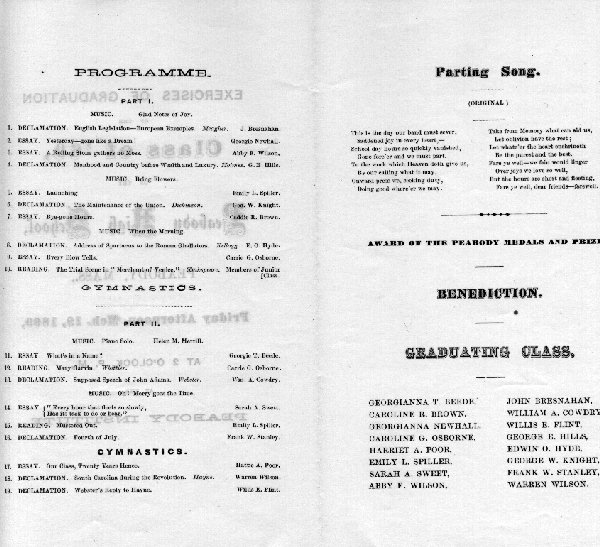
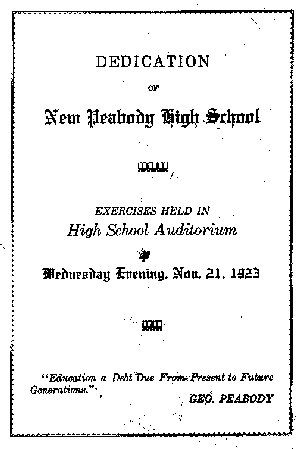 Dedication
Exercises Program November, 1923
Dedication
Exercises Program November, 1923
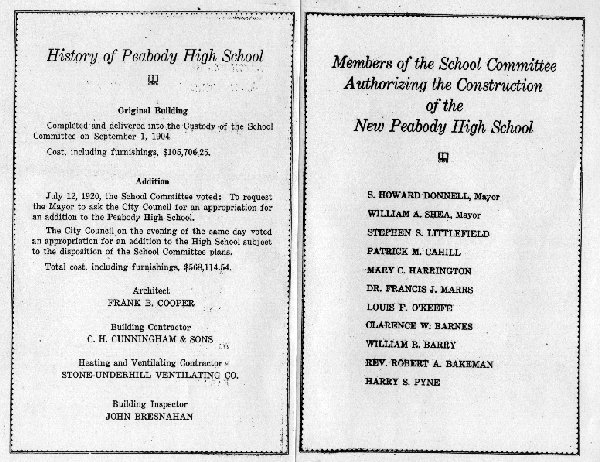
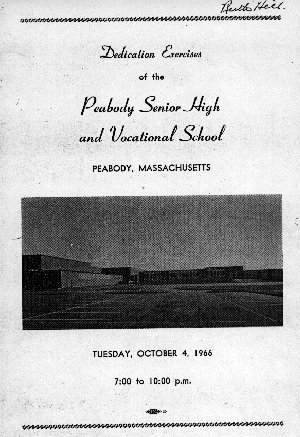 Dedication
Exercises Program, October 1966
Dedication
Exercises Program, October 1966
